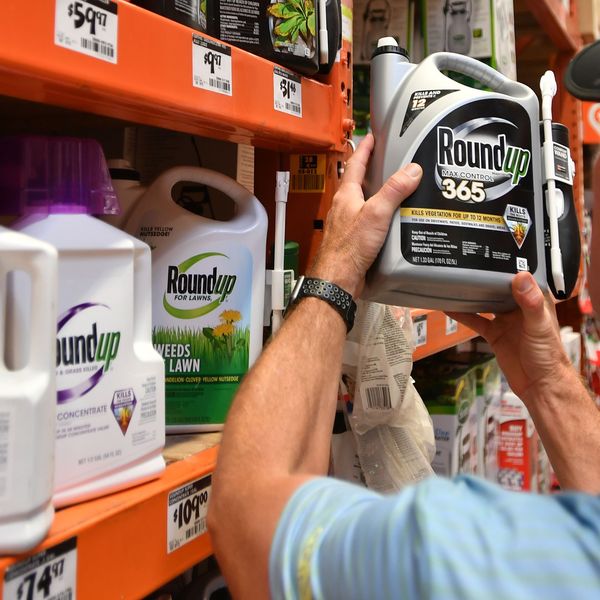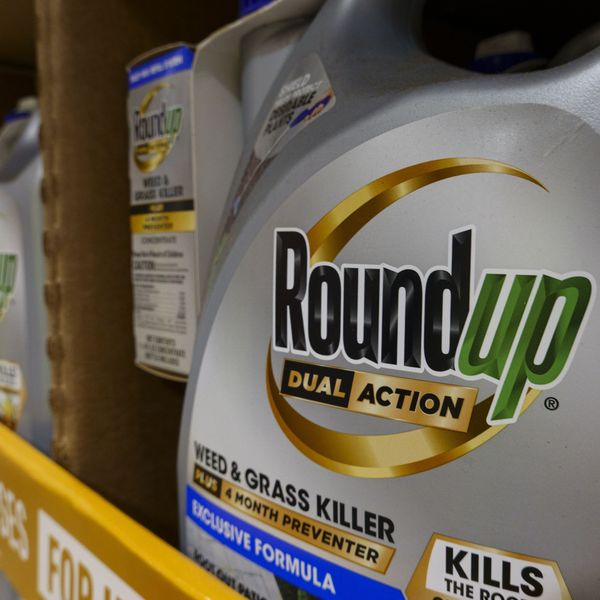
Protesters hold balloons on January 20, 2018 in Berlin during a demonstration under the slogan "We are fed up" against agricultural politics and the use of glyphosate, dumping exports and for sustainable agriculture. (Photo: Tobias Schwarz/AFP/Getty Images)
Because 'A World Without Insects Is Not Worth Living In,' Germany Announces Plan to Ban Glyphosate
"What we need is more humming and buzzing."
The German government announced Wednesday it had agreed on a plan to phase out the use of glyphosate--the key chemical in the weedkiller Roundup--with a total ban set to begin by the end of 2023.
"Way to go, Germany!" tweeted the U.S.-based advocacy group Organic Consumers Association.
Chancellor Angela Merkel's cabinet agreed to the plan Wednesday. The proposal, reported Bloomberg, also says that the "government intends to oppose any request for the E.U. to renew the license to produce the weedkiller, according to a release by the environment ministry."
The European Commission, the E.U.'s rules and regulations body, in 2017 renewed the license for glyphosate in the bloc through the end of 2022.
Germany's environment Minister, Svenja Schulze, framed the new move as necessary to protect biodiversity, and said that "a world without insects is not worth living in".
"What harms insects also harms people," Schulze said at a press conference. "What we need is more humming and buzzing."
Glyphosate is no longer exclusive to Monsanto's Roundup, as it "is now off-patent and marketed worldwide by dozens of other chemical groups including Dow Agrosciences and Germany's BASF," as Reuters noted.
That's despite the World Health Organization's International Agency for Research on Cancer's 2015 designation of glyphosate as a "probable carcinogen," increasing concerns over its health effects, and mounting legal woes for Bayer, which acquired Monsanto last year, as multiple juries have found Roundup to have been a factor in plaintiffs' cancers.
Such concerns prompted Austria to become the first E.U. country to ban glyphosate, a step it took in July.
Erwin Preiner, a member of the Austrian parliament who worked on the ban, said at the time, "We want to be a role model for other countries in the E.U. and the world."
An Urgent Message From Our Co-Founder
Dear Common Dreams reader, The U.S. is on a fast track to authoritarianism like nothing I've ever seen. Meanwhile, corporate news outlets are utterly capitulating to Trump, twisting their coverage to avoid drawing his ire while lining up to stuff cash in his pockets. That's why I believe that Common Dreams is doing the best and most consequential reporting that we've ever done. Our small but mighty team is a progressive reporting powerhouse, covering the news every day that the corporate media never will. Our mission has always been simple: To inform. To inspire. And to ignite change for the common good. Now here's the key piece that I want all our readers to understand: None of this would be possible without your financial support. That's not just some fundraising cliche. It's the absolute and literal truth. We don't accept corporate advertising and never will. We don't have a paywall because we don't think people should be blocked from critical news based on their ability to pay. Everything we do is funded by the donations of readers like you. Will you donate now to help power the nonprofit, independent reporting of Common Dreams? Thank you for being a vital member of our community. Together, we can keep independent journalism alive when it’s needed most. - Craig Brown, Co-founder |
The German government announced Wednesday it had agreed on a plan to phase out the use of glyphosate--the key chemical in the weedkiller Roundup--with a total ban set to begin by the end of 2023.
"Way to go, Germany!" tweeted the U.S.-based advocacy group Organic Consumers Association.
Chancellor Angela Merkel's cabinet agreed to the plan Wednesday. The proposal, reported Bloomberg, also says that the "government intends to oppose any request for the E.U. to renew the license to produce the weedkiller, according to a release by the environment ministry."
The European Commission, the E.U.'s rules and regulations body, in 2017 renewed the license for glyphosate in the bloc through the end of 2022.
Germany's environment Minister, Svenja Schulze, framed the new move as necessary to protect biodiversity, and said that "a world without insects is not worth living in".
"What harms insects also harms people," Schulze said at a press conference. "What we need is more humming and buzzing."
Glyphosate is no longer exclusive to Monsanto's Roundup, as it "is now off-patent and marketed worldwide by dozens of other chemical groups including Dow Agrosciences and Germany's BASF," as Reuters noted.
That's despite the World Health Organization's International Agency for Research on Cancer's 2015 designation of glyphosate as a "probable carcinogen," increasing concerns over its health effects, and mounting legal woes for Bayer, which acquired Monsanto last year, as multiple juries have found Roundup to have been a factor in plaintiffs' cancers.
Such concerns prompted Austria to become the first E.U. country to ban glyphosate, a step it took in July.
Erwin Preiner, a member of the Austrian parliament who worked on the ban, said at the time, "We want to be a role model for other countries in the E.U. and the world."
The German government announced Wednesday it had agreed on a plan to phase out the use of glyphosate--the key chemical in the weedkiller Roundup--with a total ban set to begin by the end of 2023.
"Way to go, Germany!" tweeted the U.S.-based advocacy group Organic Consumers Association.
Chancellor Angela Merkel's cabinet agreed to the plan Wednesday. The proposal, reported Bloomberg, also says that the "government intends to oppose any request for the E.U. to renew the license to produce the weedkiller, according to a release by the environment ministry."
The European Commission, the E.U.'s rules and regulations body, in 2017 renewed the license for glyphosate in the bloc through the end of 2022.
Germany's environment Minister, Svenja Schulze, framed the new move as necessary to protect biodiversity, and said that "a world without insects is not worth living in".
"What harms insects also harms people," Schulze said at a press conference. "What we need is more humming and buzzing."
Glyphosate is no longer exclusive to Monsanto's Roundup, as it "is now off-patent and marketed worldwide by dozens of other chemical groups including Dow Agrosciences and Germany's BASF," as Reuters noted.
That's despite the World Health Organization's International Agency for Research on Cancer's 2015 designation of glyphosate as a "probable carcinogen," increasing concerns over its health effects, and mounting legal woes for Bayer, which acquired Monsanto last year, as multiple juries have found Roundup to have been a factor in plaintiffs' cancers.
Such concerns prompted Austria to become the first E.U. country to ban glyphosate, a step it took in July.
Erwin Preiner, a member of the Austrian parliament who worked on the ban, said at the time, "We want to be a role model for other countries in the E.U. and the world."

